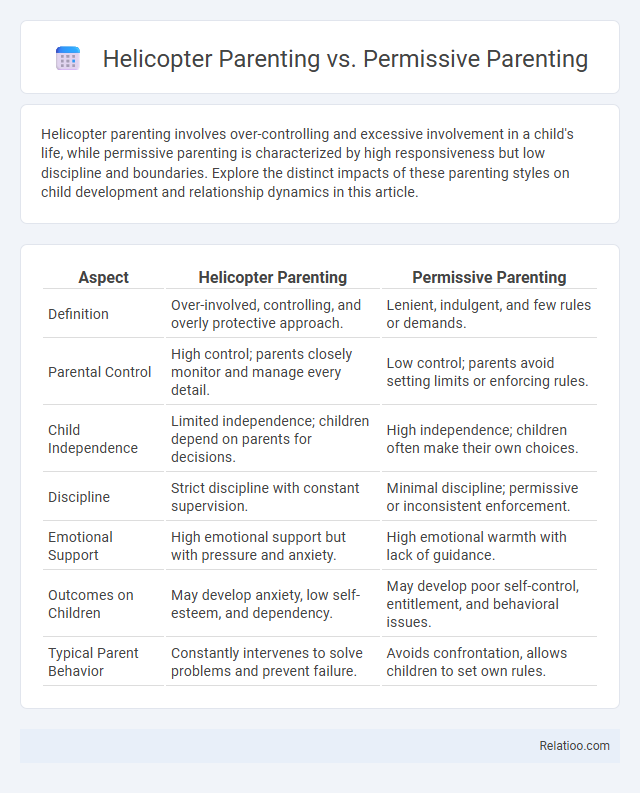Helicopter parenting involves over-controlling and excessive involvement in a child's life, while permissive parenting is characterized by high responsiveness but low discipline and boundaries. Explore the distinct impacts of these parenting styles on child development and relationship dynamics in this article.
Table of Comparison
| Aspect | Helicopter Parenting | Permissive Parenting |
|---|---|---|
| Definition | Over-involved, controlling, and overly protective approach. | Lenient, indulgent, and few rules or demands. |
| Parental Control | High control; parents closely monitor and manage every detail. | Low control; parents avoid setting limits or enforcing rules. |
| Child Independence | Limited independence; children depend on parents for decisions. | High independence; children often make their own choices. |
| Discipline | Strict discipline with constant supervision. | Minimal discipline; permissive or inconsistent enforcement. |
| Emotional Support | High emotional support but with pressure and anxiety. | High emotional warmth with lack of guidance. |
| Outcomes on Children | May develop anxiety, low self-esteem, and dependency. | May develop poor self-control, entitlement, and behavioral issues. |
| Typical Parent Behavior | Constantly intervenes to solve problems and prevent failure. | Avoids confrontation, allows children to set own rules. |
Understanding Helicopter Parenting
Helicopter parenting involves overly controlling and micromanaging children's lives to protect them from failure or harm, often stifling independence and problem-solving skills. Permissive parenting, by contrast, is characterized by high responsiveness but low demands, allowing children significant freedom with minimal discipline, which can lead to lack of boundaries. Understanding helicopter parenting helps identify its impact on child development, such as increased anxiety and reduced resilience, highlighting the importance of balancing guidance with autonomy.
Defining Permissive Parenting
Permissive parenting is characterized by a high level of warmth and low expectations for discipline, often resulting in parents who act more like friends than authority figures. Unlike helicopter parenting, which involves close monitoring and intervention in every aspect of a child's life, permissive parents allow their children significant freedom and few boundaries. Understanding these distinctions helps you recognize how parenting styles impact child development and behavior.
Key Differences Between the Two Styles
Helicopter parenting involves intensely monitoring and controlling a child's activities to prevent failure, while permissive parenting is characterized by low demands and high responsiveness, often resulting in fewer rules and boundaries. The key difference lies in control levels: helicopter parents micromanage decisions, whereas permissive parents allow children significant freedom with minimal guidance. Your approach impacts a child's development by either fostering dependency through overprotection or encouraging autonomy but risking insufficient discipline.
Impact on Child Development
Helicopter parenting, characterized by excessive control and over-involvement, often leads to increased anxiety and reduced self-efficacy in children, hindering their problem-solving skills and independence. Permissive parenting, marked by low demands and high responsiveness, can result in children exhibiting poor self-discipline, impulsivity, and difficulties in social regulation. In contrast, authoritative parenting, which balances clear expectations with emotional support, fosters resilience, social competence, and healthier emotional development in children.
Psychological Effects on Children
Helicopter parenting often leads to increased anxiety and reduced problem-solving skills in children due to excessive control and lack of autonomy. Permissive parenting, characterized by low discipline and high responsiveness, can result in poor self-regulation and behavioral issues as children struggle to set boundaries. Balanced parenting styles promote emotional resilience and independence, mitigating the psychological risks linked to both helicopter and permissive approaches.
Academic Performance and Motivation
Helicopter parenting often leads to higher academic performance due to constant supervision and intervention, but it can hinder intrinsic motivation by limiting a child's sense of autonomy. Permissive parenting tends to result in lower academic achievement as children receive less guidance and structure, which can diminish their motivation to meet academic standards independently. Balanced parental involvement that encourages independence fosters better motivation and sustained academic success by allowing children to develop self-regulation and problem-solving skills.
Social Skills and Independence
Helicopter parenting often limits children's development of independence by excessively monitoring and intervening in their activities, which can hinder the acquisition of social skills due to reduced opportunities for autonomous interaction. Permissive parenting, characterized by high responsiveness but low demandingness, may allow greater freedom but can result in insufficient guidance, potentially leading to challenges in self-regulation and social boundaries. Balanced parenting approaches foster social skills and independence by encouraging exploration and problem-solving within supportive limits, enabling children to build confidence and competence in social environments.
Long-Term Consequences in Adulthood
Helicopter parenting often leads to adults struggling with independence and decision-making due to overreliance on parental guidance. Permissive parenting may result in challenges with self-discipline and authority, as individuals might lack boundaries and structure during development. Your understanding of these long-term consequences highlights the importance of balanced parenting approaches that foster autonomy while providing appropriate support.
Striking a Healthy Parenting Balance
Striking a healthy parenting balance requires navigating between helicopter parenting, which involves intense supervision and control, and permissive parenting, characterized by leniency and minimal discipline. Effective parenting combines setting clear boundaries and fostering independence, allowing children to develop resilience while feeling supported. Research indicates that balanced parental involvement promotes better emotional regulation and decision-making skills in children compared to extremes of overprotection or permissiveness.
Tips for Choosing the Right Parenting Approach
Choosing the right parenting approach requires understanding the distinct impacts of helicopter, permissive, and authoritative styles on child development. Helicopter parenting often leads to overprotection, potentially hindering independence, while permissive parenting may result in lack of boundaries, affecting self-discipline. Prioritize a balanced approach that fosters autonomy and supports guidance by setting clear expectations, encouraging decision-making, and maintaining consistent communication tailored to the child's temperament and needs.

Infographic: Helicopter parenting vs Permissive parenting
 relatioo.com
relatioo.com